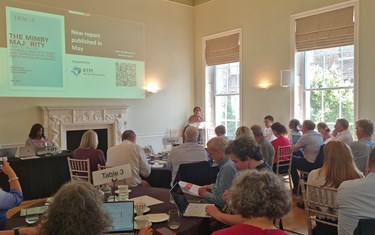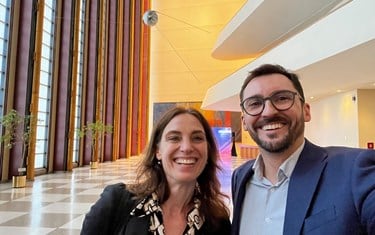Victoria Geoghegan, President of the Planning Officers Society (2021-2022), Assistant Director, Planning & Building Control, Royal Borough of Greenwich
 I have been reflecting on the wonderful things that Chief Planning Officers do on a daily, weekly, monthly, and yearly basis to deliver joined up strategic place-making and how important that role is in shaping and delivering quality development on the ground in a collaborative manner.
I have been reflecting on the wonderful things that Chief Planning Officers do on a daily, weekly, monthly, and yearly basis to deliver joined up strategic place-making and how important that role is in shaping and delivering quality development on the ground in a collaborative manner.
What is a Chief Planner?
Chief Planners are instrumental in articulating the value of placemaking and the cross departmental agenda that the planning system should deliver. As the RTPI identified in their June 2019 Chief Officers Research Paper, we need to understand the environment in which we operate.
This includes local political motivations, seeking to achieve buy in and retain the strategic long-term vision, whilst understanding the realpolitik dynamic of the short election timescale and the need for politicians to be seen to be delivering. Easy then?
We are tested and performance managed continuously. You have passed/failed your Housing Delivery Test, where’s my planning application decision? Where is your local plan? And do you have 5-year housing land supply?
The key attributes needed for a Chief Planner
Not only do we need key skills such as leadership, emotional intelligence, political nuance, influencing and being commercially aware. We also must think about how to secure delivery of homes and jobs in both the short and long term. Plus, all the other elements that deliver comprehensive quality growth. Through gathering evidence, data and developing joined up policies to set a framework we ensure good quality developments get permissions and poor ones don’t (that is the theory anyway).
So, how can we ensure that local authorities deliver exemplar growth and developments and that no aspect of our functions are left wanting when that development is built and occupied?
Why a Chief Planner is important
The role of Chief Planner is crucial in any local authority area. We have been on a journey recently with COVID-19 meaning we have had to pick up our services and deliver them from our dining room tables!
It is about knowing who to bring into those conversations along the way to ensure it is all covered. It reminds me of the research done a few years ago by the LGA on the C21st public servant and what that means after years of austerity and increased citizen expectation. We are planning professionals, technical experts but also need to be story tellers, brokers and navigators acting on behalf of residents in the area. The only way to ensure you do this well is to join those dots up to deliver placemaking that is palatable to communities. You only need to see the reaction to the Planning White Paper from those that thought democracy was being removed from the planning system.
Chief Planners must know what is needed for their local authority area, what is already there and what conversations are going on about future delivery models. It is key to know what others are doing so that when we formulate policy or approve development it genuinely contributes to positive placemaking. We want to strive to achieve regeneration (in its broadest sense), not just redevelopment and certainly not just gentrification when a site in an area comes forward.
By this I mean ensuring longer term social, environmental and economic outcomes are met and understanding what this means for the placemaking agenda… joining those dots and working in a cross-cutting manner to ensure developments deliver the regeneration of an area and not just stand-alone, ill-thought-out redevelopments that never contribute to that wider placemaking piece.
It isn’t just about an exemplar designed piece of built form but what does that development do wider than that – deliver jobs, invests in skills and training, taps into the local supply chain, delivers affordable homes and helps develop a cohesive community. The aspects of placemaking that aren’t always apparent when you walk down the pretty looking street and who can contribute within your organisation to bring this to fruition.
Effective leadership requires a range of skills. It is essential the next generation of planners develops these skills to champion the influence of planning in wider corporate strategies of local authorities.
This is how a Chief Planner rises to the challenge and strives to deliver collaborative, joined up place-making within a local authority.
The RTPI and POS signed a concordat of understanding in 2020.


